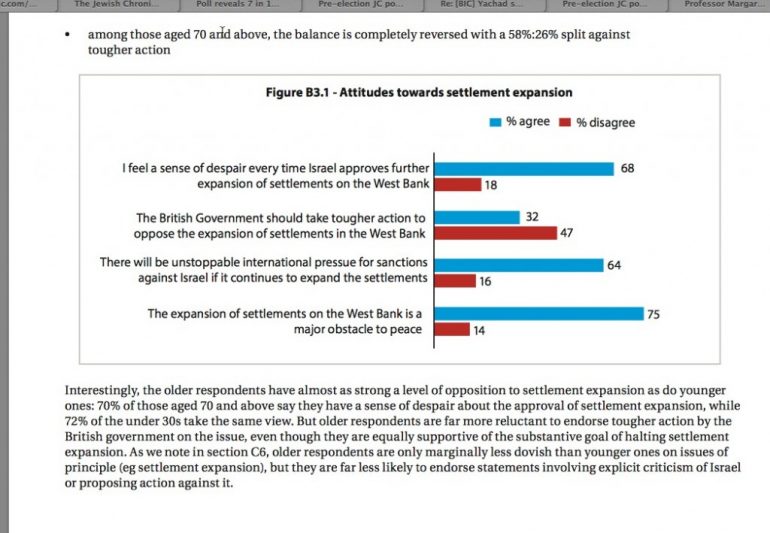Cross posted by Judy Keiner at Times of Israel
Lots of headlines yesterday in the UK and Israel about a claimed totally independent survey done by IPSOS MORI, that says a huge percentage of UK Jews feel Israeli policies re settlements make them feel ashamed, the world is going to impose more sanctions if Israel doesn’t get out of the settlements, etc. (A Guardian report by Harriet Sherwood, uncritically citing the survey results, has been shared over 4000 times.)
Which is really strange, because a genuinely independent carefully sampled and non-loaded question survey of UK Jews at the time of the Israeli elections this year found that a huge majority of UK Jews supported Bibi Netanyahu.
Well, the research may have been technically assembled and carried out by IPSOS MORI, but it will have been shaped and the questions devised by the organisation that paid for it, Yachad, and the three retired academics who wrote the covering report, whose views are all in line with those promoted by Yachad, the UK equivalent of JStreet.
You can have all sorts of highly sophisticated number crunching methodology and convincing surrounding kosher social science apparatus attached.
You can even have a section of questions which appear to go against your usual message, just so no-one can claim you’re only asking questions which suit your agenda.
But that’s just a nifty way of covering your back.
Because your key aim is to show that a huge percentage of your respondents agree with your core messages. The other questions are just wrapping paper.
The key way to get a totally biased survey outcome matching the message you really want to put across is this: is feed your respondents a whole set of statements that embody the political views you want to push, and then invite them to agree or disagree.
Social Science Research Methods 101: if you invite people to agree or disagree with loaded statements, a much higher proportion will agree than if you measured their opinions by enabling them to have a choice of what statements they agree with and include some that represent very different political positions.
In the chart above, taken from the survey, the key example of loaded bias that demonstrates that this Yachad poll is a carefully tarted up bit of opinion management posing as a valid social science survey. The statements are all core Yachad positions which the respondents are invited to agree or disagree with. No statements of opposing or contrasting positions on offer.
Not only that, but they’re almost all couched in highly emotional language, adding further bias to draw sympathy. Stuff like “I feel a sense of despair every time Israel approves further expansion of settlements on the West Bank” and “There will be unstoppable international pressure for sanctions against Israel if it continues to expand the settlements.”
What you don’t get are any alternative choices like “The conflict isn’t really about settlements” or “The major obstacle to peace is Palestinian intransigence”.
This Yachad survey, with its beautifully designed presentation and its array of eminent profs and highly-professional pollsters, must have cost a bomb.
I wonder who paid?
But whoever did, and however beautiful it looks, and however elaborate the statistical percentages, with questions as loaded as those, it doesn’t amount to a hill of beans.





